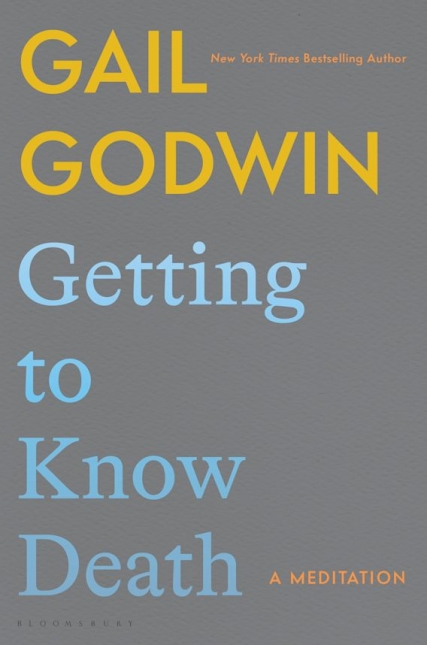Getting to Know Death: A Meditation
- By Gail Godwin
- Bloomsbury Publishing
- 192 pp.
- Reviewed by Patricia Schultheis
- June 13, 2024
A wise, wandering contemplation of what comes next.

On June 6, 2022, author Gail Godwin broke her neck. Weeks shy of her 85th birthday, Godwin, who lived alone, fell in her back yard while trying to water a withering dogwood. She recalls wondering, as she lay on her gravelly walk, if saving herself was worth the effort. “Do you WANT to make it? I’m not sure. Yes or no. I feel more curiosity than I feel resolve. That will have to suffice.”
Two months later, Godwin began her latest book, Getting to Know Death: A Meditation, an anecdotal recounting of her complex recovery, as well as an epistolary memoir and an eschatological examination of mankind’s universal, inevitable fate.
The letters in Getting to Know Death are a treasure trove of remembrance and candor, something sadly lacking in today’s correspondence by text and email. From childhood, Godwin had been friends with Pat Verhulst, a professor at Mars Hill College in North Carolina, and the letters between them comprise a good part of the book.
In one, Verhulst, who’s accumulated a stash of “goodnight” pills, writes a poem about how, just as she was about to take them, she “called for help instead.” In another, Godwin admits that, years before breaking her neck, she “entertained scenarios of snuffing myself out.”
Even after Verhulst’s death, Godwin continues writing to her friend, telling her about Rusa, Godwin’s resourceful healthcare worker, and about her own worries about money. Elsewhere, in response to a letter from her half-brother, Godwin writes that the last time she saw their grandmother, “I could still smell her Dorothy Gray face cream. Soft skin.” In another exchange, the editor of Godwin’s journals manages to write to her despite having multiple sclerosis:
“There is so much ground to cover and so many good stories I wish I could share with you. My God, what a rich life!”
Godwin infuses Getting to Know Death with a questing religiosity. Again and again, she returns to the theme of “Year’s Mind,” a Church of England term referring to the anniversary of someone’s passing, and more deeply, to how the dead never truly depart: They live on in our minds and memories. “He is very alive. I appreciate him more and more,” Godwin writes to her stepson about her husband, who died 22 years earlier. “I increasingly see him in myself,” her stepson responds, “which is a good thing.”
Another throughline in Getting to Know Death is the phrase, “This is my life, but I may not get to do what I want in it.” The expression comes from a talk Godwin gave at the 13th Carolina Mountains Literary Festival. The subject was “the Desperate Place.” Godwin writes that two of her relatives, her father and her half-brother, found their lives so desperate, they chose to end them. She reveals that, at 18, and a stellar student without any hope of going to college, she saw her own situation as equally hopeless and frustrating, especially after learning classmates would be going off to Duke and Radcliffe. Recalling how abandoned she felt, she writes:
“God was undergoing some very slippery changes in my psyche. He had ceased being the attentive heavenly father who was always aware of me. And he had not yet expanded into the mystery beyond my understanding that I am still pursuing today.”
For Godwin, the author of 14 novels and two collections of short stories, writing is a form of prayer. Her faithfulness to her craft and the immersive nature of that craft allow her to probe profound questions. For decades, words have been the bricks she used to construct life’s meaning; it’s only natural that, in attempting to “know” death, she quotes from her work and revisits how her own characters dealt with the issue.
Unfortunately, none of them had the answer, and Godwin’s own attempt is too meandering to be truly illuminating. Rather, it feels rushed. An understandable flaw, perhaps, given the author’s age and the book’s subject matter. Besides, as magnificent as they may be in the hands of as fine a writer as Gail Godwin, words are puny tools for expressing what lies behind the curtain separating what’s now from what’s next.
Patricia Schultheis is the author of 40 published short stories, including the award-winning collection St. Bart’s Way. She is also the author of Baltimore’s Lexington Market, published in 2007, and A Balanced Life, published in 2018. She is the recipient of numerous awards and honors and is a member of the National Book Critics Circle. She lives in Baltimore.

